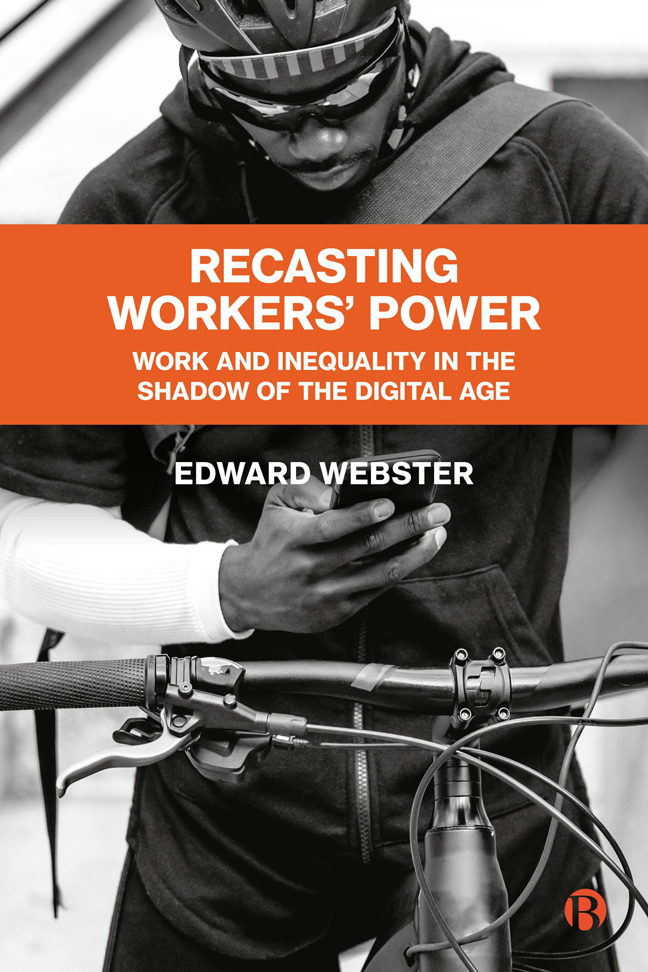Book contents
- Frontmatter
- Contents
- List of Figures and Tables
- List of Abbreviations
- Preface
- 1 The End of Labour? Rethinking the Labour Question in the Digital Age
- 2 Precarious Work after Apartheid: Experimenting with Alternative Forms of Representation in the Informal Sector
- 3 Neo-liberalism Comes to Johannesburg: Changing the Rules of the Game
- 4 Divided Workers, Divided Struggles: Entrenching Dualisation and the Struggle for Equalisation in South Africa's Manufacturing Sector
- 5 Authoritarian Algorithmic Management: The Double-edged Sword of the Gig Economies
- 6 Crossing the Divide: Informal Workers and Trade Unions
- 7 Global Capital, Global Labour: The Possibilities of Transnational Activism
- 8 Changing Sources of Power and the Future of Southern Labour
- Index
1 - The End of Labour? Rethinking the Labour Question in the Digital Age
Published online by Cambridge University Press: 23 January 2024
- Frontmatter
- Contents
- List of Figures and Tables
- List of Abbreviations
- Preface
- 1 The End of Labour? Rethinking the Labour Question in the Digital Age
- 2 Precarious Work after Apartheid: Experimenting with Alternative Forms of Representation in the Informal Sector
- 3 Neo-liberalism Comes to Johannesburg: Changing the Rules of the Game
- 4 Divided Workers, Divided Struggles: Entrenching Dualisation and the Struggle for Equalisation in South Africa's Manufacturing Sector
- 5 Authoritarian Algorithmic Management: The Double-edged Sword of the Gig Economies
- 6 Crossing the Divide: Informal Workers and Trade Unions
- 7 Global Capital, Global Labour: The Possibilities of Transnational Activism
- 8 Changing Sources of Power and the Future of Southern Labour
- Index
Summary
Nearly three decades ago, Manuel Castells (1996) triumphantly declared that the atomising effects of the new technologies of the ‘information age’ and the dislocating effects of globalisation presaged the ‘end of labour’. By labour, Castells was referring to the organisations that represent the collective interests of workers – that is, the labour movement – which he suggested had been historically superseded.
There is little doubt that the labour movement worldwide is no longer the social force it was in the twentieth century. But much of the debate on the future of work and the consequences for worker organising has focused on responses to technological trends in the Global North. More evidence is required to understand how these trends are impacting on work and workers in the Global South. In this introductory chapter, we discuss the need to rethink the labour question in the digital age. We focus on two major drivers of ongoing structural change – globalisation and digitalisation – and their implications for labour. The innovation in our approach lies in the way in which we contest Castell's provocative claim by linking emerging forms of worker organisation – both formal and informal – to the changing nature of capital and the ways in which the working class is constantly being restructured.
We have divided the chapter into four parts. In Part I we attempt to ‘rethink the labour question’ within an African context. We suggest that labour scholarship in South Africa would benefit from looking towards Africa to learn from comparative processes of precarisation of work and the struggles emerging against it. We compare economic and labour market indicators from South Africa, Kenya and Uganda – the three countries from which the case studies contained in this book originate.
Part II begins with an analysis of the impact that globalisation and the new global production regime has had on labour. We examine those who have wrestled with Polanyi's (1944) notion of capitalisms’ pendulum-like swings between periods of market domination and state regulation. This literature draws on Polanyi to explain the rise of the neo-liberal world order and to search for what he saw as ‘counter-movements’ to ‘protect society’ from neo-liberalism's rampant commodification of land, money and labour (Polanyi, 1944). We introduce Burawoy's (2010) critique of the ‘false optimism’ of contemporary Polanyian labour studies.
- Type
- Chapter
- Information
- Recasting Workers' PowerWork and Inequality in the Shadow of the Digital Age, pp. 1 - 29Publisher: Bristol University PressPrint publication year: 2023

